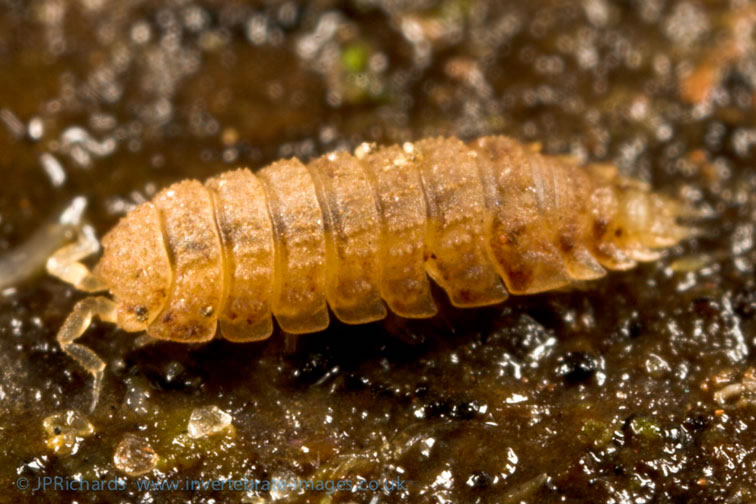Haplophthalmus danicus Budde-Lund in Meinert, 1880
Common name
Status:
GB IUCN status: Least Concern
ID Difficulty
Identification
The pygmy woodlice of family Trichoniscidae (and Styloniscidae) are readily distinguished from other woodlice by the shape of the antennal fagellum which comprises a tapered cone (of indistinct segments) bearing a terminal bristle.
The genus Haplophthalmus is readily recognised by having distinct longitudinal dorsal ridges on the body which has a continuous body outline (all other trichoniscid woodlice have a stepped body outline) and has eyes composed of a single black ocellus.
Haplophthalmus danicus is a small white to buff species (to 4mm). The longitudinal dorsal ridges, which are characteristic of the genus, are much less distinct than seen in H. mengii and H. montivagus, and it also lacks the pair of prominent projections on the third pleonite that is characteristic of those two species.
The male has a characteristic upwardly directed spur on the carpus of the 7th leg.
Distribution
Although common in many south-eastern areas, it becomes increasingly rare further north, but is known from scattered sites in southern Scotland. There is also a scatter of records from Ireland, mainly in the east.
Habitat
It is often associated damp well-vegetated habitats, such as damp woodland, farmyards, churchyards and gardens, where it typically inhabits damp rotten wood, peaty debris and compost heaps.
This summary is based on the detailed account in Gregory (2009).
References
Gregory, S. (2009) Woodlice and Waterlice (Isopoda: Oniscidea & Asellota) in Britain and Ireland. Field Studies Council/Centre for Ecology & Hydrology.
Links
World List of Marine, Freshwater and Terrestrial Isopod Crustaceans: https://www.marinespecies.org/isopoda/aphia.php?p=taxdetails&id=260522











